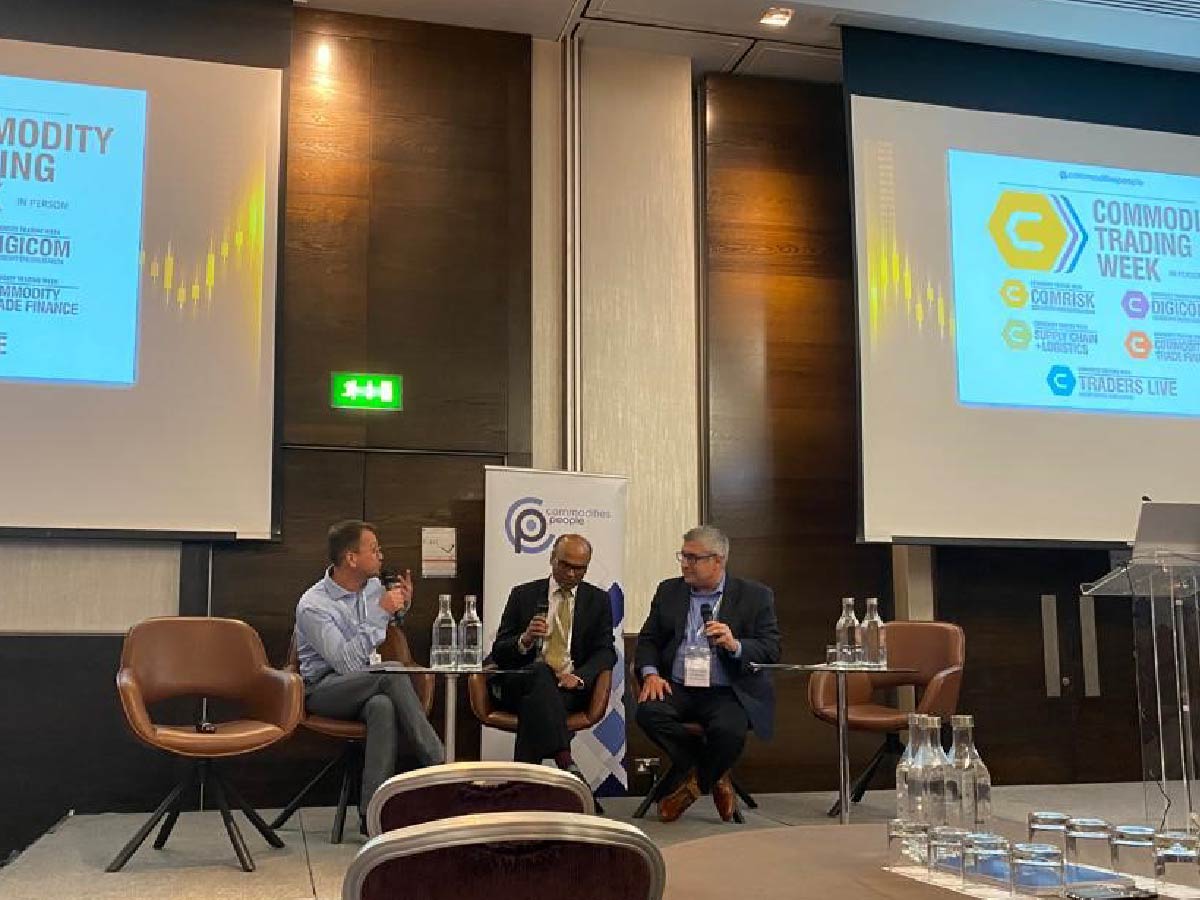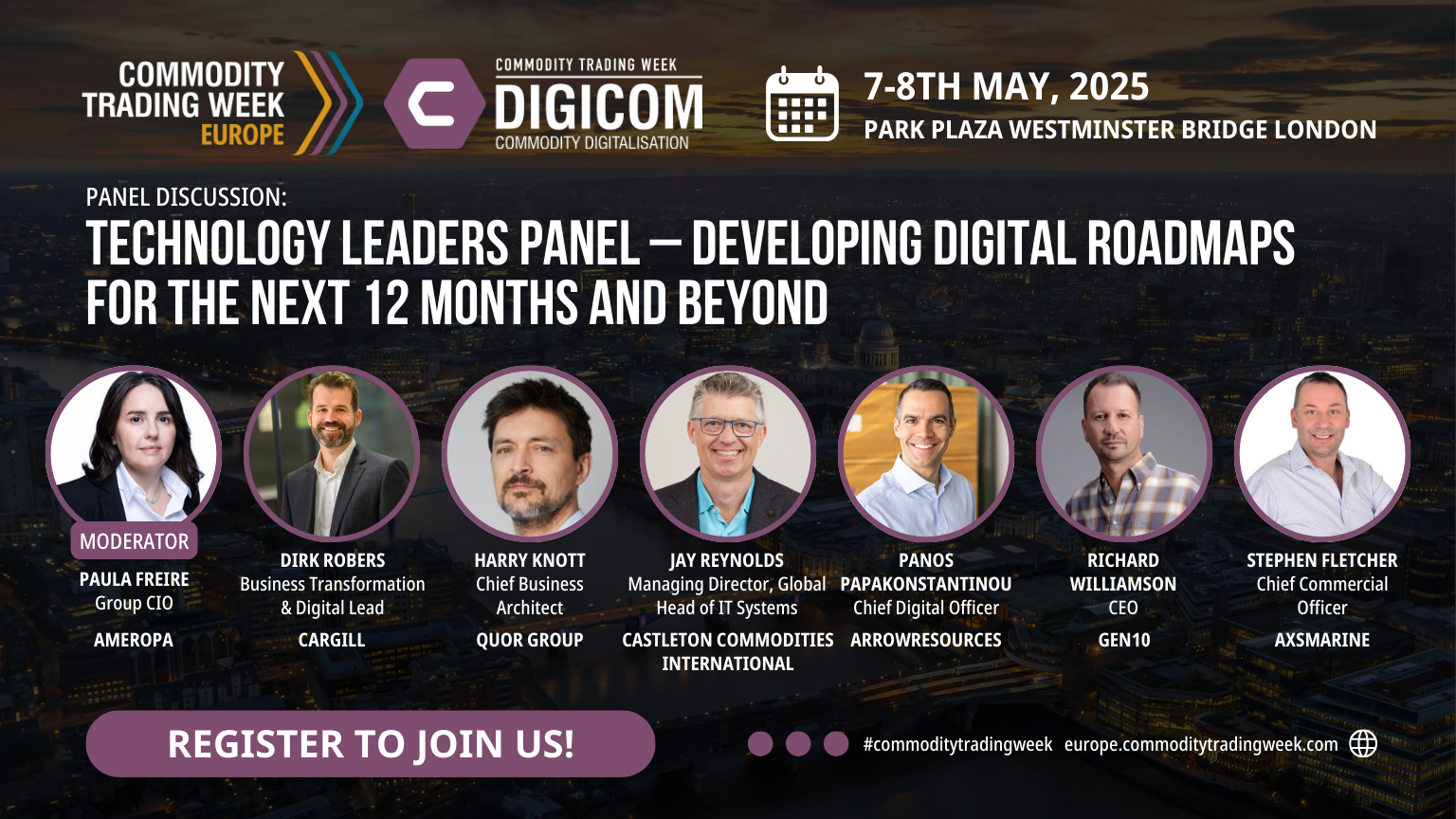Carbon, climate change and ESG all featured heavily at Commodity Trading Week in London this April, with the topics discussed across each of the 5 forums at the event. We will be sharing our insights from the conference over the coming weeks, but for now wanted to share our two highlights of the event.
ESG and climate change – the risk manager’s perspective
This panel session included Richard Williamson, Gen10 CEO, alongside Vijay Chakravarthy, Global Head of Risk at ED&F Man Group. They discussed many aspects of both ESG and climate change, including the urgency of the problem, managing counterparties and supply chain risks, and carbon credits.
Catch up on the full discussion now
A quick recap
If you don’t have time to watch the full session right now, some of the main takeaways include:
- The climate challenge isn’t going to go away and if we had our priorities right it would be on the front page of all newspapers all the time.
- Procurement models will change to account for the cost of carbon.
- No two carbon credits are the same, so how do you price them?
- And counterparties represent the same problem – will we soon see them graded on their ESG credentials, similar to how we manage credit risk? Market data providers are already starting to give ESG ratings.
- There is no global body for standardised carbon credits and no legal framework. On top of jurisdictional and regulatory risks, some countries may not recognise international credits or may retain credits to use for their sovereign balance fund, so there is still much uncertainty.
- We are trying to plan for the long term but it’s still difficult to price that forward long exposure. For example, carbon credits in Europe traded in the single digit prices for a long time, before rising to €20 two years ago and around €85 recently.
- There is little liquidity further out, with no prices beyond 2025 right now, but offsetting projects can easily run over 25 years so can offer longer-term contracts.
- The lack of harmonisation across borders and market inefficiencies are being used as an excuse not to try to improve carbon offsetting, but we do have to try.
- Yes, contracts aren’t standard, but scalability is still possible.
When asked how we meet these challenges, the panel had several suggestions. These include the importance of embedding the building blocks such as audits and minimum standards in company processes. It was also suggested that we can look back to how risk management was embedded and incentivised for a model of what works.
The other major suggestion was to treat ESG as an iterative process. Rather than waiting around for a “perfect” solution, begin by implementing the best ideas available right now then optimise them down the line. Digital transformation can support this, being an iterative process itself, and helps to combat the lack of standardisation; ESG efforts do not need to be standard to be effective, but they do need to be documented.
Trading the transition
Moderator Eddie Tofpik was joined by Bruce Tozer, of Gen10’s Advisory Board and Richard Fu, Head of Commodities at Shanghai Pudong Development Bank to discuss the challenges and opportunities of trading the energy transition.
Watch the full session now
The key messages
Bruce and Richard began by discussing the importance and urgency of the energy transition, commenting in particular on how the pace of the transformation has accelerated despite the global pandemic and the clear change in organisational thinking, with so many net zero commitments by major companies. And interest is not limited to one geography but is global in scale.
The main message from the session is that the energy transition is a great opportunity and it will be very difficult to separate commodities from carbon and ESG moving forward. However, there are many challenges, including high volatility and the possibility of mistakes, particularly around the potential of being caught “greenwashing”, which will likely cause some bad scandals.
The advice on avoiding greenwashing was to begin by reducing emissions, and when offsetting to be very clear about the type of offset and how visible and regulated it is. Most people would suspect that if a credit is cheap and several years old it may not be good quality.
The panel also discussed the energy mix, from nuclear to hydrogen, and the ongoing complexities involved. The transition will be bumpy and we still need fossil fuels, but will they be able to change their image, and how will policy change impact them, as the energy transition progresses?
In terms of other commodities, metals, smelting and mining are expected to lead the way. This is in large part due to rapidly-growing demand for electric vehicles and battery metals. Agriculture was brought up as an industry that will need to rely on offsets as producers cannot create zero emissions products. Methane emissions arise from crops including rice as well as cattle, and energy costs are driving up fertiliser prices, making farmers more attentive to waste.
This shows that the environmental challenge goes beyond carbon, and data and measurement will be important in a range of areas of ESG, although many consider the environment the biggest challenge right now. The panel also discussed the importance of sourcing good quality, additional offset credits, and the importance of being careful when hedging. The big takeaways from this session were that there are real opportunities here, but it’s also dangerous and volatile, so be attentive.
If your organisation is looking to turn sustainability into a profit centre, set up a carbon desk or create better systems for managing your ESG data, get in touch with us today. Gen10 have a range of solutions to create transparency, efficiency and profitability in environmental markets.



